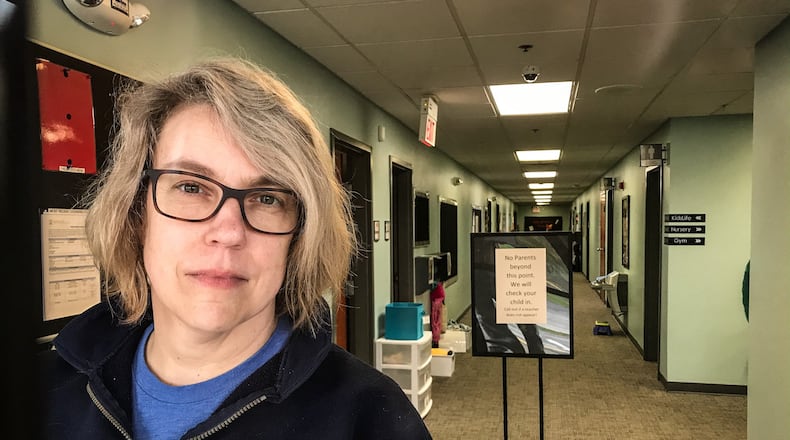The governor signed an executive order that allowed the Temporary Pandemic Child Care licenses to go into effect today. At the end of the day Wednesday, 1,500 centers across the state and the Miami Valley had been approved, and 500 applications were waiting to be reviewed, officials said.
The complete list of Temporary Pandemic Child Care centers can be found here.
MORE: CORONAVIRUS: Complete coverage
The program is expected to be in place until April 30, but it could be extended if necessary. Adult daycare facilities are not eligible for the temporary licenses, and must remain closed until further notice.
“We haven’t faced an enemy like we are facing today in 102 years — we are at war,” DeWine said in a statement. “In the time of war, we must make sacrifices, and I thank all of our Ohio citizens for what they are doing and what they aren’t doing. You are making a huge difference, and this difference will save lives.
“Right now, we are in a crucial time in this battle. What we do now will slow this invader so that our healthcare system will have time to treat those who have contracted COVID-19 and also have time to treat those who have other medical problems. Time is of the essence,” he said.
Daycare facilities that are issued licenses must abide by three main rules, in addition to state regulations that are already in place, said Bret Crow, spokesman for the Ohio Department of Jobs and Family Services. Temporary Pandemic Child Care facilities must ensure there are no more than six children per room at all times; interaction between parents dropping and picking up kids and the staff must be limited; and siblings and children whose parents work for the same employer must be kept in the same room as much as possible.
MORE: Coronavirus: Businesses should use good judgment about staying open, Husted says
There’s no cap on the number of Temporary Pandemic Child Care licenses the state is issuing, Crow said.
“Any child care center, family child care home or in home aide willing to abide by the rules to operate as a pandemic child care provider can operate come Thursday,” he said.
As part of the program, the state will continue subsidizing families that have been receiving child care assistance, Crow said. There are about 117,000 children across the state who receive some sort of public funding to attend daycare. That number was down to 17,000 Tuesday as DeWine encouraged parents to find alternative forms of child care to protect their children against the coronavirus.
All Dayton-area YMCAs were granted the temporary licenses. The organization has formed partnerships with other area non-profit organizations such as St. Vincent DePaul and hospitals to assist their essential employees with child care, said President and CEO Dale Brunner.
For instance, the YMCA is offering a 50% discount for Kettering Health Network’s essential employees, he said.
“We’re trying to do the best for the community at this point in time,” Brunner said. “It’s our mission. We take care of anyone and everyone when they need us the most, and it’s the YMCA’s job right now to assist the community.”
MORE: Coronavirus: Area workers question essential vs. nonessential
Some area daycare providers said they welcome the opportunity to continue caring for children whose parents are needed in the fight against the COVID-19 pandemic. But given the health risks, they had to give it some thought before proceeding, said Kimberly Jarvis, who owns On Purpose Academy and Mentoring Center at 51 Best St. in Dayton.
Prior to applying for the Temporary Pandemic Child Care license, she met with her staff of 15 full-timers in addition to some part-timers and contractors. With the exception of one elderly worker who has a higher risk of getting infected with the coronavirus, all of her employees agreed that they’d continue coming to work.
“I was really glad because as an administrator you are going (back and forth, wondering) if I’m jeopardizing my staff or jeopardizing the future of our business that we work so hard for,” said Jarvis. “I also have to make the right decision for my own family. So just knowing that they need us (to care for kids) helps us make the right decision.”
There are about 160 children enrolled at her facility, she said, and on Wednesday morning, about 25% of parents who qualify had applied for Temporary Pandemic Child Care. About 80% of families at her facility qualify for child care subsidies, Jarvis said.
MORE: Coronavirus: 400,000 people visited unemployment website Tuesday, Husted says
Although the Temporary Pandemic Child Care executive order will help keep some child care facilities in business, Cara Rigsbee, executive director Precious Ones Learning Day Care Beavercreek, said it won’t make a difference. She said the majority of her families don’t quality for public subsidies, and most parents’ profession don’t fall in the “essential” category.
As of Tuesday evening, parents of 10 children had applied for temporary day care, she said, adding that she normally have about 130 children enrolled. That’s not enough to remain afloat, Rigsbee said, adding that she’s already had to lay off most of her staff. It’s possible that the business could fold.
“So we’re struggling right now,” she said.
Parents who work in any of the ‘essential’ professions below can take their children to area daycare centers that have been issued Temporary Pandemic Child Care licenses
- Hospital and clinic staff
- Dentists
- Pharmacy staff
- Nursing home, elder care, and home health care workers
- Psychologists
- Psychiatrists
- Mental health counselors
- Developmental disability aides
- First responders (police, fire and EMT)
About the Author
